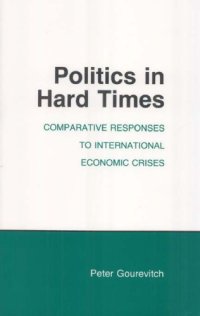
Ebook: Politics in hard times: comparative responses to international economic crises
Author: Gourevitch Peter
- Tags: Economic policy, Business cycles, International economic relations, Geschichte, Kapitalismus, Wirtschaftskrise, Governments -- Policies -- Formulation -- Role of economic crises
- Series: Cornell studies in political economy
- Year: 1986
- Publisher: Cornell University Press
- City: Ithaca
- Language: English
- pdf
Policy requires politics. Ideas for solving economic problems are plentiful, but if an idea is to prevail as the actual policy of a particular government, it must obtain support from those who have political power. Economic theory can tell us a lot about policy alternatives, but unless our economics contains an understanding of power, it will not tell us enough to understand the choices actually made.
In this book I wish to gain an understanding of the politics of policy choice through a "political sociology of political economy"—that is, by looking at the politics of support for different economic policies in response to large changes in the international economy. When na- tional economies are interdependent, crises are international. No country escapes, for a crisis is a stimulus to which all must respond. By examining what countries do, by looking at how their responses vary, we can learn something about the countries themselves and about the factors that lead them to choose particular policies.
Each crisis involves a sequence of events which can be summarized quickly. In the prosperous years preceding the crisis, a policy approach and support coalition developed. Then came crisis, challenging both policy and coalition. Crisis opened the system of relationships, making politics and policy more fluid. Finally a resolution was reached, closing the system for a time, until the next crisis.
In this book I wish to gain an understanding of the politics of policy choice through a "political sociology of political economy"—that is, by looking at the politics of support for different economic policies in response to large changes in the international economy. When na- tional economies are interdependent, crises are international. No country escapes, for a crisis is a stimulus to which all must respond. By examining what countries do, by looking at how their responses vary, we can learn something about the countries themselves and about the factors that lead them to choose particular policies.
Each crisis involves a sequence of events which can be summarized quickly. In the prosperous years preceding the crisis, a policy approach and support coalition developed. Then came crisis, challenging both policy and coalition. Crisis opened the system of relationships, making politics and policy more fluid. Finally a resolution was reached, closing the system for a time, until the next crisis.
Download the book Politics in hard times: comparative responses to international economic crises for free or read online
Continue reading on any device:

Last viewed books
Related books
{related-news}
Comments (0)